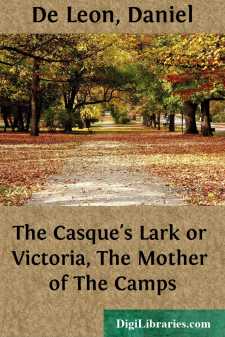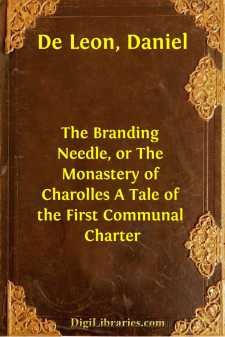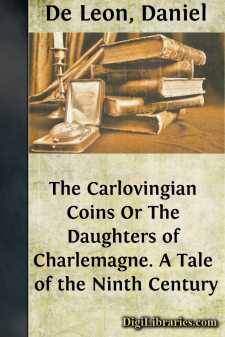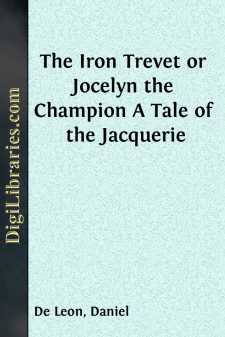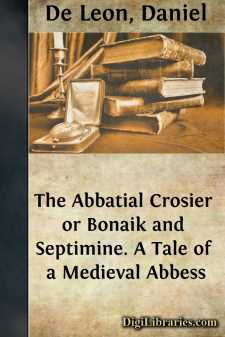Categories
- Antiques & Collectibles 13
- Architecture 36
- Art 48
- Bibles 22
- Biography & Autobiography 815
- Body, Mind & Spirit 144
- Business & Economics 28
- Children's Books 18
- Children's Fiction 14
- Computers 4
- Cooking 94
- Crafts & Hobbies 4
- Drama 346
- Education 58
- Family & Relationships 59
- Fiction 11835
- Games 19
- Gardening 17
- Health & Fitness 34
- History 1378
- House & Home 1
- Humor 147
- Juvenile Fiction 1873
- Juvenile Nonfiction 202
- Language Arts & Disciplines 89
- Law 16
- Literary Collections 686
- Literary Criticism 179
- Mathematics 13
- Medical 41
- Music 40
- Nature 180
- Non-Classifiable 1768
- Performing Arts 7
- Periodicals 1453
- Philosophy 65
- Photography 2
- Poetry 896
- Political Science 203
- Psychology 44
- Reference 154
- Religion 515
- Science 126
- Self-Help 85
- Social Science 83
- Sports & Recreation 34
- Study Aids 3
- Technology & Engineering 59
- Transportation 23
- Travel 463
- True Crime 29
Daniel De Leon
Daniel De Leon was an influential American socialist and Marxist theorist active in the late 19th and early 20th centuries. He was a leading figure in the Socialist Labor Party of America (SLP) and advocated for revolutionary industrial unionism, playing a pivotal role in the development of the Industrial Workers of the World (IWW). De Leon's writings and speeches emphasized the necessity of worker control over production and a democratic socialist society.
Author's Books:
Sort by:
by:
Daniel De Leon
THE ORCHARD OF MARPHISE. What I here have to narrate occurs towards evening on a beautiful autumn day, in the orchard of Marphise, the noble Lady of Ariol. The orchard, which lies in the close vicinity of the ramparts of the city of Blois, is surrounded by a high wall, crowned by a hedge of yoke-elm. A handsome summer-pavilion rises in the middle of the garden. The trees are numerous, and their...
more...
by:
Daniel De Leon
INTRODUCTION. I, Schanvoch, a descendant of Joel, the brenn of the tribe of Karnak; I, Schanvoch, now a freeman, thanks to the valor of my father Ralf and the bold Gallic insurrections that continued unabated from century to century; I, Schanvoch, write the following narrative two hundred and sixty-four years after my ancestress Genevieve, the wife of Fergan, witnessed in Judea the death of the poor...
more...
by:
Daniel De Leon
CHAPTER I. It was about the fifteenth year of the reign of the Emperor Tiberius that I, Genevieve, a slave of Aurelia, the wife of a Roman named Gremion and located in Marseilles, departed from Marseilles with my mistress and her husband for Judea. The dominion of the Romans, at that period, extended from one end of the world to the other. Judea had submitted to them, as a dependence of the province of...
more...
by:
Daniel De Leon
CHAPTER I. THE SIGNAL. About fifty years have elapsed since King Clotaire had his son Chram burned alive together with the latter's wife and daughters. Let us forget the spectacle of desolation that conquered Gaul continues to present under the descendants of Clovis for the last fifty years, and rest our eyes upon the Valley of Charolles. Oh, the fathers of the happy inhabitants who people that...
more...
by:
Daniel De Leon
CHAPTER I. THE SERFS OF PLOUERNEL. The day touched its close. The autumn sun cast its last rays upon one of the villages of the seigniory of Plouernel. A large number of partly demolished houses bore testimony to having been recently set on fire during one of the wars, frequent during the eleventh century, between the feudal lords of France. The walls of the huts of the village, built in pise, or of...
more...
by:
Daniel De Leon
CHAPTER I. AMAEL AND VORTIGERN. Towards the commencement of the month of November of the year 811, a numerous cavalcade was one afternoon wending its way to the city of Aix-la-Chapelle, the capital of the Empire of Charles the Great—an Empire that had been so rapidly increased by rapidly succeeding conquests over Germany, Saxony, Bavaria, Bohemia, Hungary, Italy and Spain, that Gaul, as formerly...
more...
by:
Daniel De Leon
CHAPTER I. THE TAVERN OF ALISON THE HUFFY. On a Sunday, towards the end of the month of October of 1356, a great stir was noticeable since early morning in the little town of Nointel, situated a few leagues from the city of Beauvais, in the department of Beauvoisis. The tavern of Alison the Huffyâso nicknamed from her hot temper, although she was a good womanâwas rapidly filling with...
more...
by:
Daniel De Leon
CHAPTER I. ROTHBERT, COUNT OF PARIS. The house of Master Eidiol, the dean of the Skippers' or Mariners' Guild of Paris, was situated not far from the port of St. Landry and of the ramparts of that part of the town that is known as the Cite, which is bathed by the two branches of the Seine, and is flanked with towers at the entrance of the large and the small bridge, its only means of access...
more...
by:
Daniel De Leon
CHAPTER I. NARBONNE. Cruel intestine wars between the descendants of the Frankish conquerors were devastating Gaul when the Arab invasion took place in 719. The invaders poured down from the Pyrenees and drove back or subjugated the Visigoths. The exchange of masters was almost a gain to the inhabitants of the region. The conquerors from the south were more civilized than those from the north. Many of...
more...



